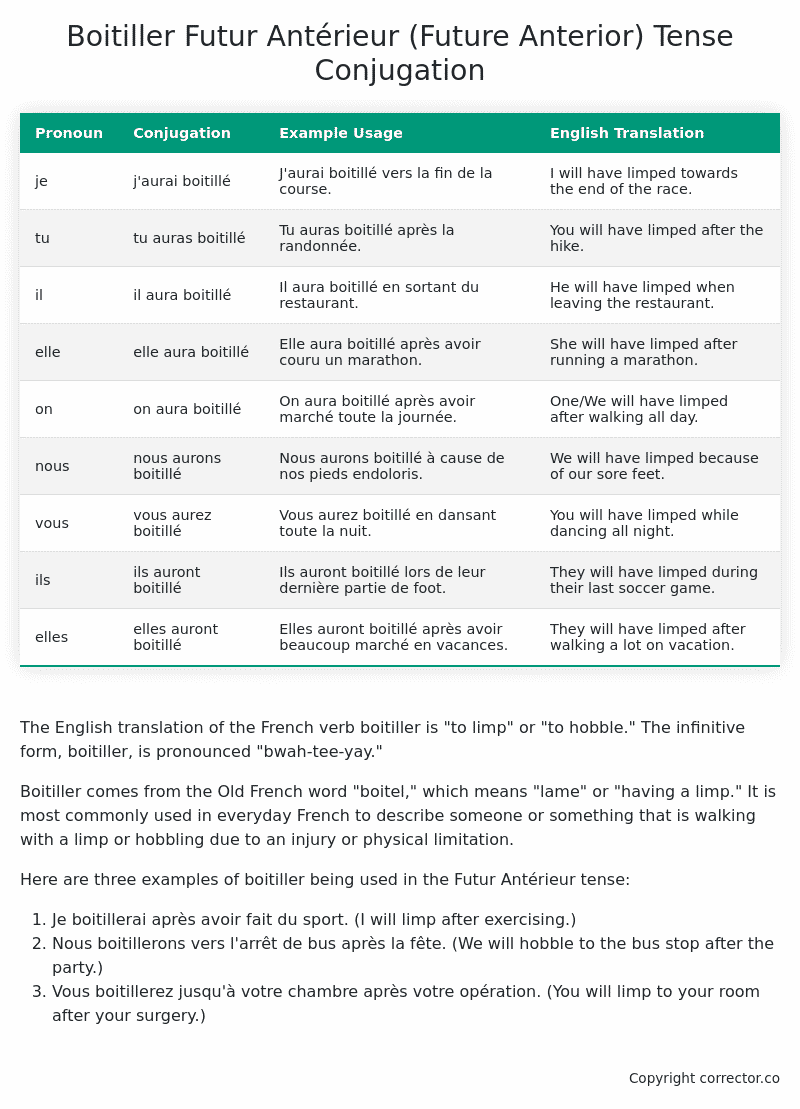Futur Antérieur (Future Anterior) Tense Conjugation of the French Verb boitiller
Introduction to the verb boitiller
The English translation of the French verb boitiller is “to limp” or “to hobble.” The infinitive form, boitiller, is pronounced “bwah-tee-yay.”
Boitiller comes from the Old French word “boitel,” which means “lame” or “having a limp.” It is most commonly used in everyday French to describe someone or something that is walking with a limp or hobbling due to an injury or physical limitation.
Here are three examples of boitiller being used in the Futur Antérieur tense:
- Je boitillerai après avoir fait du sport. (I will limp after exercising.)
- Nous boitillerons vers l’arrêt de bus après la fête. (We will hobble to the bus stop after the party.)
- Vous boitillerez jusqu’à votre chambre après votre opération. (You will limp to your room after your surgery.)
Table of the Futur Antérieur (Future Anterior) Tense Conjugation of boitiller
| Pronoun | Conjugation | Example Usage | English Translation |
|---|---|---|---|
| je | j’aurai boitillé | J’aurai boitillé vers la fin de la course. | I will have limped towards the end of the race. |
| tu | tu auras boitillé | Tu auras boitillé après la randonnée. | You will have limped after the hike. |
| il | il aura boitillé | Il aura boitillé en sortant du restaurant. | He will have limped when leaving the restaurant. |
| elle | elle aura boitillé | Elle aura boitillé après avoir couru un marathon. | She will have limped after running a marathon. |
| on | on aura boitillé | On aura boitillé après avoir marché toute la journée. | One/We will have limped after walking all day. |
| nous | nous aurons boitillé | Nous aurons boitillé à cause de nos pieds endoloris. | We will have limped because of our sore feet. |
| vous | vous aurez boitillé | Vous aurez boitillé en dansant toute la nuit. | You will have limped while dancing all night. |
| ils | ils auront boitillé | Ils auront boitillé lors de leur dernière partie de foot. | They will have limped during their last soccer game. |
| elles | elles auront boitillé | Elles auront boitillé après avoir beaucoup marché en vacances. | They will have limped after walking a lot on vacation. |
Other Conjugations for Boitiller.
Le Present (Present Tense) Conjugation of the French Verb boitiller
Imparfait (Imperfect) Tense Conjugation of the French Verb boitiller
Passé Simple (Simple Past) Tense Conjugation of the French Verb boitiller
Passé Composé (Present Perfect) Tense Conjugation of the French Verb boitiller
Futur Simple (Simple Future) Tense Conjugation of the French Verb boitiller
Futur Proche (Near Future) Tense Conjugation of the French Verb boitiller
Plus-que-parfait (Pluperfect) Tense Conjugation of the French Verb boitiller
Passé Antérieur (Past Anterior) Tense Conjugation of the French Verb boitiller
Futur Antérieur (Future Anterior) Tense Conjugation of the French Verb boitiller (this article)
Subjonctif Présent (Subjunctive Present) Tense Conjugation of the French Verb boitiller
Subjonctif Passé (Subjunctive Past) Tense Conjugation of the French Verb boitiller
Subjonctif Imparfait (Subjunctive Imperfect) Tense Conjugation of the French Verb boitiller
Subjonctif Plus-que-parfait (Subjunctive Pluperfect) Tense Conjugation of the French Verb boitiller
Conditionnel Présent (Conditional Present) Tense Conjugation of the French Verb boitiller
Conditionnel Passé (Conditional Past) Tense Conjugation of the French Verb boitiller
L’impératif Présent (Imperative Present) Tense Conjugation of the French Verb boitiller
L’infinitif Présent (Infinitive Present) Tense Conjugation of the French Verb boitiller
Struggling with French verbs or the language in general? Why not use our free French Grammar Checker – no registration required!
Get a FREE Download Study Sheet of this Conjugation 🔥
Simply right click the image below, click “save image” and get your free reference for the boitiller Futur Antérieur tense conjugation!

Boitiller – About the French Futur Antérieur (Future Anterior) Tense
Construction
Common Everyday Usage Patterns
Interactions with Other Tenses
For example
Summary
I hope you enjoyed this article on the verb boitiller. Still in a learning mood? Check out another TOTALLY random French verb conjugation!


